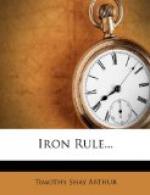Edward left the table and went on his errand. He soon returned with word that Andrew had not been to school all day.
Knife and fork fell from the hands of Mr. Howland, and the mother’s face instantly grew pale.
“I felt troubled about him all day,” murmured the latter.
“He was home at dinner time?” said Mr. Howland, as he pushed his chair back from the table.
“Yes.”
“Oh dear!—oh dear! What is to become of him? I’ve tried everything in my power to restrain him from evil, but all is of no avail.”
Just at this moment the street-door bell was rung very violently. As each one paused to listen, and the room became perfectly silent, the murmur of many voices could be heard in the street. For a few moments all was breathless expectation. The sound of the servant’s feet, as she moved along the passage to the door, throbbed on each heart, and then all sprung from their chairs, as a cry of distress was uttered by the servant, followed by men’s voices, and the entrance of a crowd of people.
Poor Mrs. Howland sunk to the floor, nerveless, while Mr. Howland sprung quickly out of the room. The story was soon told. Andrew had been out on the river with some other boys in a boat, from which he had fallen into the water, and was now brought home to his parents, to all appearance, lifeless. It proved in the end that vitality was only suspended; after an hour’s unremitted effort, by a skillful physician, the circle of life went on again.
The shock of this event somewhat subdued the mind of Mr. Howland. He felt utterly discouraged about the boy. While in this state of discouragement, he refrained from saying anything to him about his bad conduct. Indeed, in view of this second narrow escape from death, his feelings were a good deal softened toward Andrew, and something like pity took the place of anger. During the two days that the lad was convalescing, his father said little to him; but what little he did say was spoken kindly, and with more of a parental sentiment therein than had been apparent for years. Electrically did this sentiment reach the heart of Andrew. Once when Mr. Howland took his hand, and asked in a kind voice how he felt, tears rushed to his eyes, and his lips quivered so that he could not reply. This was perceived by Mr. Howland, and he felt that his boy was not altogether given over to hardness of heart. In that moment Andrew promised in his own mind, that in future he would be a more obedient boy.
Unhappily, Mr. Howland attributed this subdued and better state of feeling in his son, to the narrow escape from drowning that he had had, and not to the real cause—the change of his own manner toward him. Through the feeble moving of sympathy and kindness in his own heart, there was the beginning of power over the perverse boy, and this power might have been exercised, had the father possessed enough of wisdom and self-denial, until he had gained a complete




